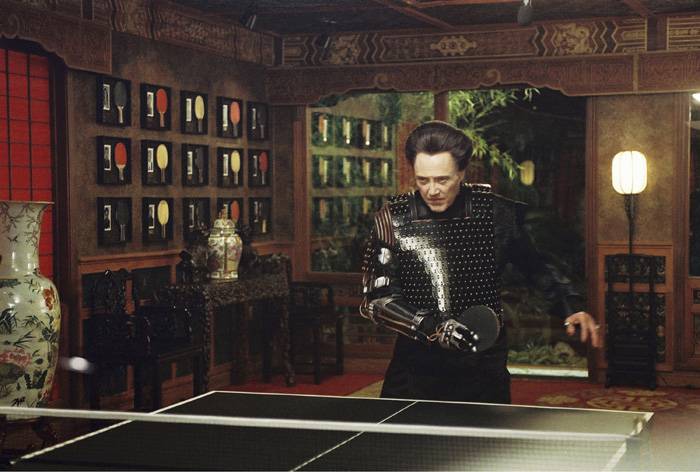Note: If you are not fascinated by the origins of the term “ping pong,” please feel free to enjoy other content on the site.
Faithful readers will be aware of how we sometimes get preoccupied with subjects growing out of a film, such as how long one can survive in space without protection, or the nature of that strange particle the Q-ball (or “non-topological soliton”), or whether shaky camera styles can make you throw up.
The latest controversy began with my review of “Balls of Fury,” in which I casually referred to the game of ping pong. That inspired a lament from Martynas Aukstuolis of Chicago, who was offended by my describing his beloved table tennis with the offensive term ping pong. “I am very sad to see you trapped by your own ignorance,” he concluded.
Not so fast there, Mr. Aukstuolis!. On Sept 21, the Answer Man published a letter from Nic Hautamaki, Harbin, China, who wrote in part: “Ping pong is most certainly not an offensive term for the sport. It is derived from ‘ping pang qiu’ in Mandarin Chinese (same pronunciation) which translates literally to “ping pong ball.” In other words, Ping Pong is the correct, Mandarin Chinese name for the sport. If any term should be considered offensive or dismissive, it’s table tennis!”
Not so fast there, Mr. Hautamaki! Now the Answer Man has to contend with several more attempts to settle the question.
Kenneth Matis, Beijing, China: “As someone who lives in China and has an obsessive need to correct facts, I need to take issue with Nic Hautamaki’s statement that ping pong is derived from Mandarin. According to Online Etymology Dictionary ping pong comes from the sound the ball makes when it hits the paddle. (See http://www.etymonline.com/index.php?term=ping-pong .) The Mandarin word probably comes from the English.”
Bradford Tuckfield, Austin TX: “Your reader Nic Hautamaki writes that “ping-pong” is not an offensive term because it “is derived from ‘ping pang qiu'” in Chinese. In fact the Chinese equivalent is merely an accurate transliteration of the English colloquial term (imitative of the sound of the ball’s collisions) found in use more than 100 years before ping-pong was exported to Asia around 1926. I don’t personally think the term is offensive even though it has always been unofficial (compared to “Table Tennis” which also etymologically predates Chinese involvement with the sport). However anyone familiar with the sport’s history will realize that the Chinese were late-comers fortunate to already have the characters to write the English onomatopoetic cognates. Its offensiveness, therefore, can only be judged on other criteria such as its colloquiality.”
Arsen Azizyan, New Haven CT: “As a Chinese major in college who has spent two years in Beijing, I am compelled to correct Nic Hautamaki’s linguistic note. The term “ping-pong” is, in fact, an onomatope which originated in England, where the sport was invented (a more anemic alternative, now thankfully lapsed, was “whiff-whaff”). The Chinese word “ping-pang” was borrowed from the English, not vice versa – although Mr. Hautamaki’s confusion is understandable, given that the Chinese invented two new characters for the term, both intentional mutations of a pre-existing, phonetically similar character (pronounced “bing”). If any of your readers had doubts as to the practical usefulness of a college education, surely my letter has helped to reinforce them.’
Jake Jacobs, Singapore: “Your correspondent is somewhat misinformed. “Ping pang qiu” came from English, not the other way around. Parker Brothers trademarked the onomatopoetic term back in 1900, and early usage goes back to 1823. The pivot of the Chinese term is “qiu” which means ball, and the “ping pang” is a phonetic copy of “ping-pong.” Your earlier correspondent’s nose was out of joint because a sport (table tennis) which he takes seriously doesn’t get much respect.”
Barton Odom, McKinney TX: “Since you asked, the difference between Ping-Pong and table tennis is not in the rules but is analogous to that between touch football and the NFL (or between backyard and tournament badminton). A friendly game of batting a ball back and forth bears little resemblance to the hard hitting (the ball does indeed move as fast as a quark, and with uncanny spin), quick moving game played in tournaments. Table tennis requires almost preternatural hand-eye coordination and a great deal of running with instant changes of direction. Both games are fun, but one requires a high level of athleticism.”












